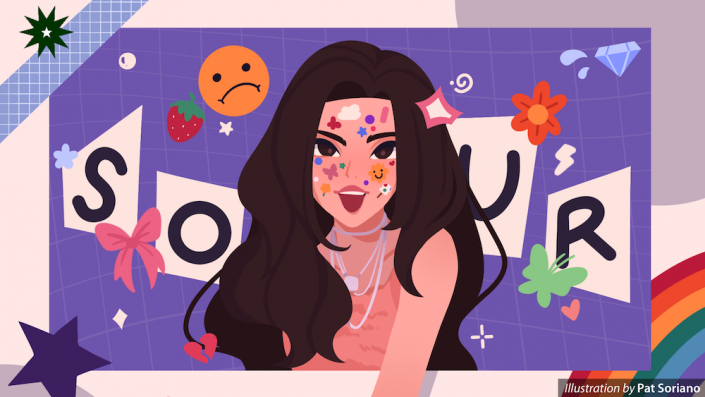
Olivia Rodrigo’s meteoric rise to fame shocked the music industry earlier this year. When her viral power ballad hit Drivers License shot atop the charts, most people saw Rodrigo’s strong fanbase from her Disney shows such as Bizaardvark and High School Musical: The Musical The Series to be a strong driving force to her success. Others saw a palpable universality and authenticity. Whatever the reason may be, one thing was for sure—the world was eager to see what Rodrigo would do next.
Luckily, they did not have to wait much longer as Rodrigo released her second single, Deja Vu, two months later, continuing her streak of singing about the complexities of teenage heartbreak. This came alongside the announcement of her first full-length record. Aptly named Sour, Rodrigo’s debut is an avenue to channel angsty adolescent emotions, eloquently articulating what it means to be a teenager in the 21st century.
A star is born
If there is one main takeaway from listening to Sour, it is that Olivia Rodrigo’s sheer talent is unmatched. Her vocal delivery packs an irresistible emotional punch. With the melancholic introspective tone she takes on Drivers License, the sheer heartbreak and self-loathing she conveys on Enough For You, and the calm and collected voice she utilizes in Hope Ur Ok—Rodrigo cleverly takes her background as an actress to bring much-needed dimensions to her lyrics.
Serving as a co-writer or sole writer throughout the tracklist, Rodrigo constantly shares her thoughts in bold, concise, and exciting ways. “Your apathy’s like a wound in salt,” she angrily cries in Good 4 U’s restrained bridge that builds up to an explosive final chorus. “Where’s my f*****g teenage dream,” she growls in the album opener, Brutal. Favorite Crime delivers an extended metaphor on how an enjoyable relationship could also be harmful to both parties.
Unrelentlessly upset
Whatever the subject matter, Rodrigo incorporates subversiveness in the narratives that she weaves. Her impassioned anger in Enough For You leads into a bridge that ends in hope for better love in the future while Happier is a heady shot of unbridled bitterness with lyrics such as, “I hope you’re happy, but don’t be happier.”
Her impeccable attention to detail also creates tangible narratives, making for emotionally resonant storytelling. Mid-tempo melodies call attention to idiosyncratic references to Billy Joel and Glee reruns in Deja Vu, while her insecurities like her inability to parallel park and being highly critical of her songs are front and center in Brutal.
Though, the details that Rodrigo chooses to highlight can sometimes be distracting. She chooses to focus on extensive details in a relationship like taking coffee and reading self-help books in Enough For You. This meandering style deprives Rodrigo’s lyrics of the self-aware introspection she often frames them with.
She would also often resort to placing obvious rhymes and cliched passages as in Traitor, “You betrayed me / And I know that you’ll never feel sorry.” Happier also precedes its hook with lines exhaustingly reminiscent of past love songs with “I hope you’re happy / But not like how you were with me.” These lines take away from the listener’s immersion to Rodrigo’s storytelling.
Do you get deja vu?
Sour sits comfortably in sweet familiarity as Rodrigo and producer Dan Nigro wear their influences on their sleeves. Its best track, Traitor, pulls heavily from early 2000s RnB, but boasts additional modern elements like layered vocals and subtle synthesizers to mirror the feeling of grandiose suitable for its heartbreaking lyrics. The bridge from Drivers License gets all its gravitas from employing powerful vocals reminiscent of Lorde’s Melodrama. An interpolation of Taylor Swift’s New Year’s Day, off her Reputation album, was effectively used in 1 Step Forward, 3 Steps Back. Rodrigo recontextualizes the piano riff originally conveying a hopeful romance in Swift’s version to a detailed account of a stagnant yet toxic relationship.
Unfortunately, not all Taylor Swift influences worked in this album. Deja Vu stylistically mirrors Taylor Swift down to a more jagged and less polished version of the shouty vocals in Swift’s Cruel Summer from her Lover record.
Good 4 U is a pop punk pastiche that doesn’t live up to the greatness of its influences due to mixing issues that don’t maximize the bombast that its high-octane chorus would have delivered. Similarly, Jealousy, Jealousy robs itself of impact by sucking the energy out of the dirty bass line and Rodrigo’s vocals.
Perhaps the album’s biggest misstep is the choice to settle for folk-style minimalist production on the album’s latter half. The listener is forced to critically examine a lot of the lapses in the songwriting, doing no favors for Rodrigo’s rookie status as a singer/songwriter.
Good for you
Much like a teenager finding their place in the world, Sour represents Rodrigo’s search for a unique brand and personality within the music sphere. Her pop-punk edge on songs like Brutal and her stripped-down acoustic melancholia on tracks like Enough For You feel more like costumes that she reluctantly tries on rather than logical extensions of her image.
However, Sour delivers on what it sets out to do—introduce the world to Olivia Rodrigo, the new main pop girl. With her no-holds-barred honesty and undeniable charisma, Rodrigo’s debut record, while unremarkable, is a promising prospect for what’s to come.
Rating: 2.5/4.0
